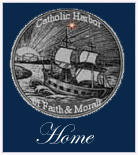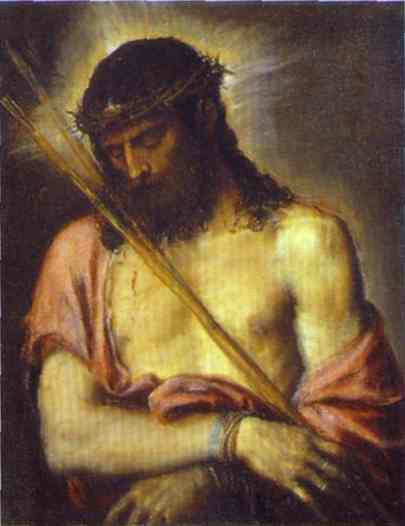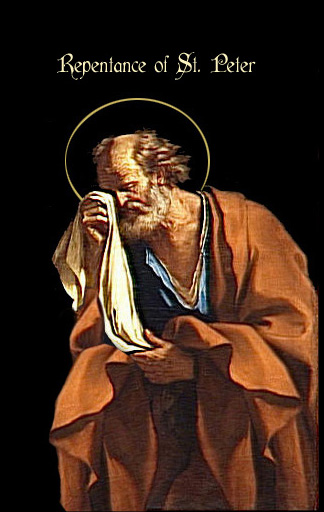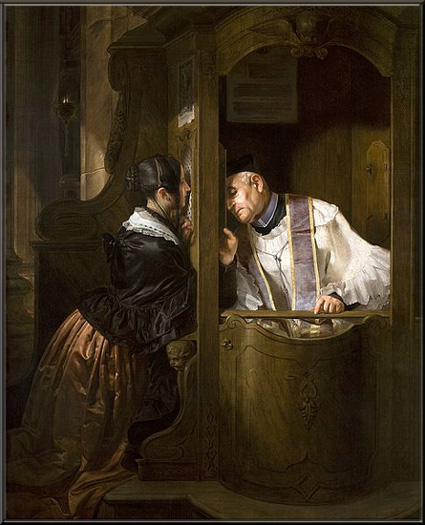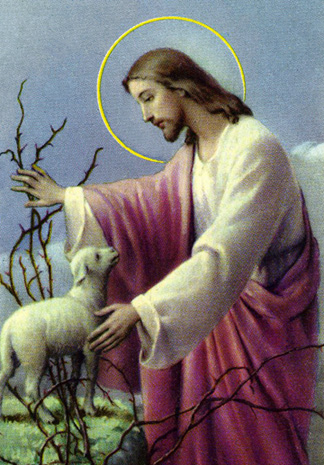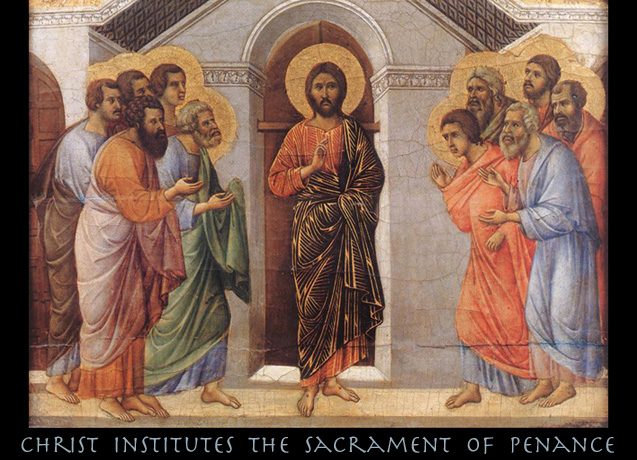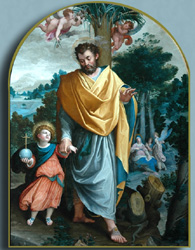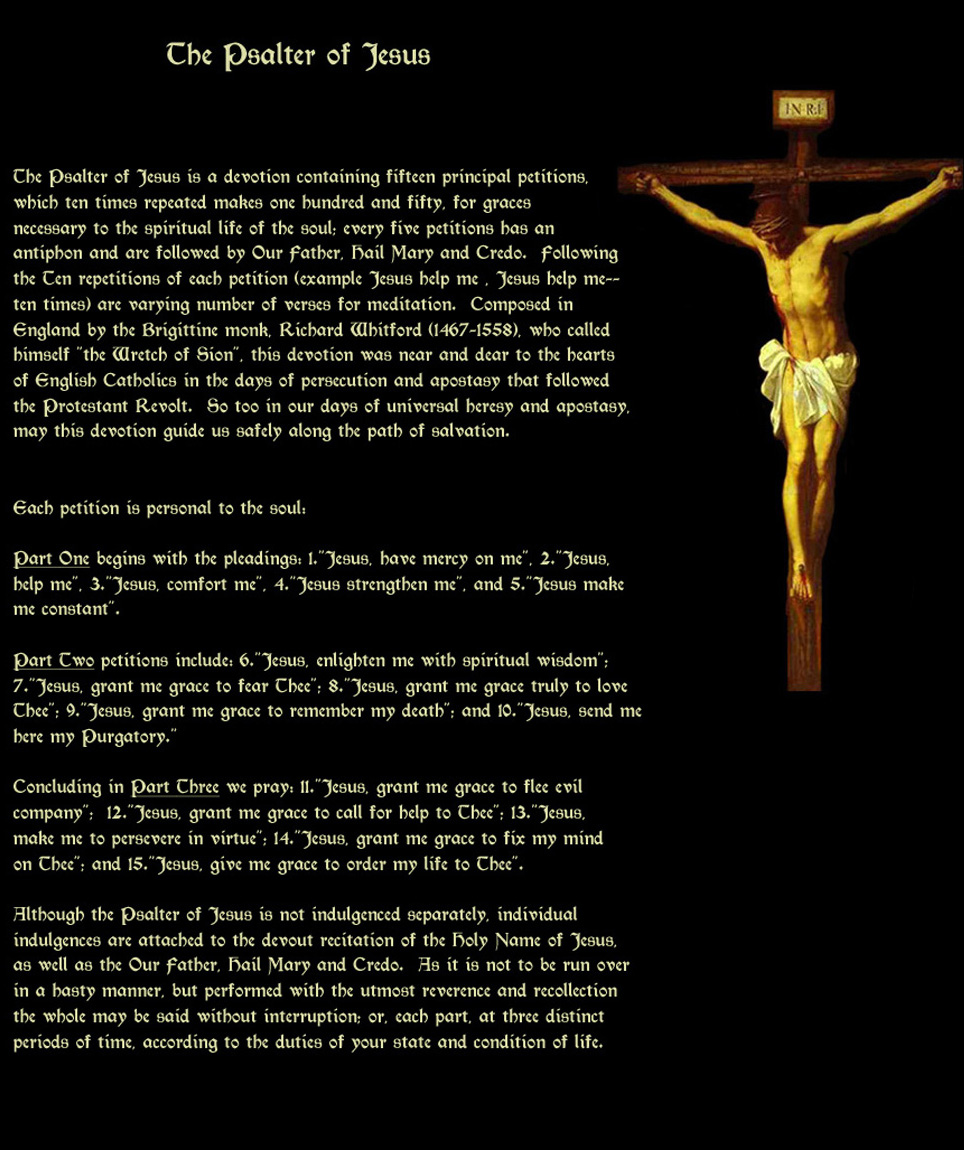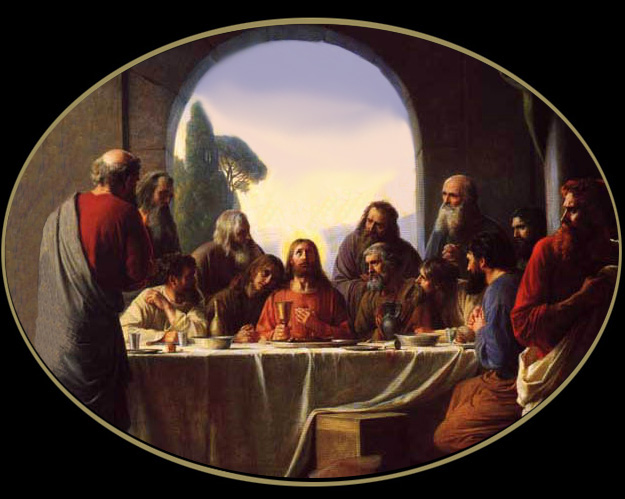Newest Additions
"Newest Additions" reflects updates to Catholic Harbor of Faith and Morals. Recently, these updates have been made solely to the home-page based upon the increased volume of new material provided. Please visit our home page for the most recent updates. Reflections on the saint of the day can still be found by clicking the following link: "Honoring the Saints" and "Each Day Imitating Christ". Eventually, we hope to provide a central index for all material on the site.
"Newest Additions" reflects updates to Catholic Harbor of Faith and Morals. Recently, these updates have been made solely to the home-page based upon the increased volume of new material provided. Please visit our home page for the most recent updates. Reflections on the saint of the day can still be found by clicking the following link: "Honoring the Saints" and "Each Day Imitating Christ". Eventually, we hope to provide a central index for all material on the site.
June 27th--Catholic Preparation for the Sacrament of Marriage

(Continued)
June 24th--The Nativity of St. John the Baptist
from the Liturgical Year (1904)
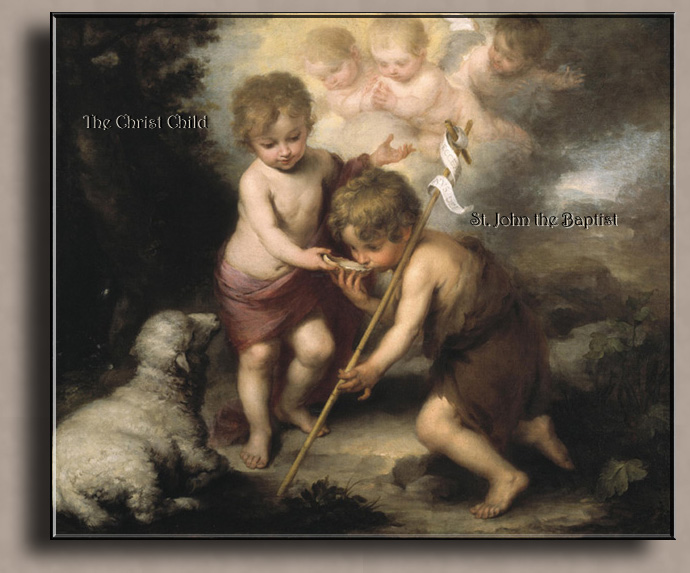
(Continued)
April 1st--The Clock of the Passion
by St. Alphonsus De Liguori

(Continued)
March 28th--Index for the Season of Lent
Passion-tide and Easter

July 16th--Our Lady of Mount Carmel
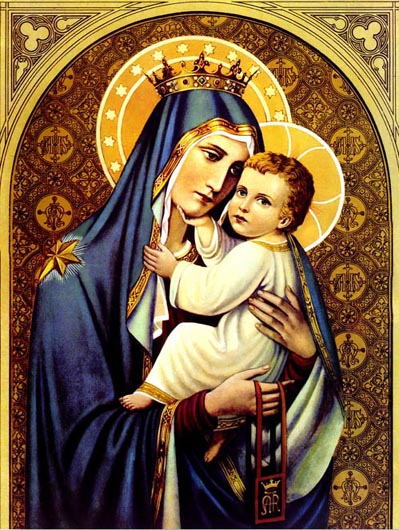
Prayers and other devotions to Our Lady of Mount Carmel are also available at this link.
July 1st--July Meditations on the Precious Blood
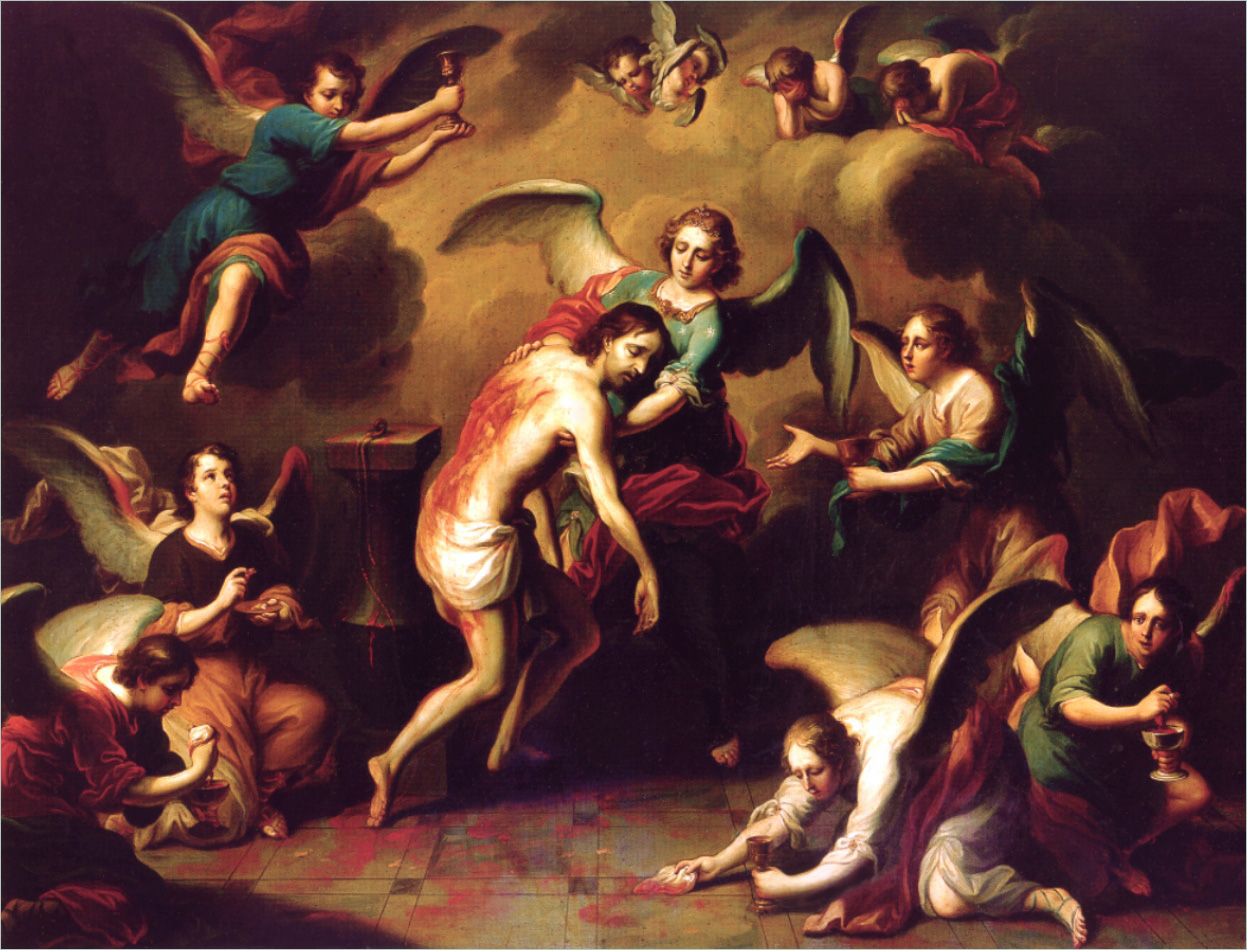
June 24th--The Nativity of St. John the Baptist
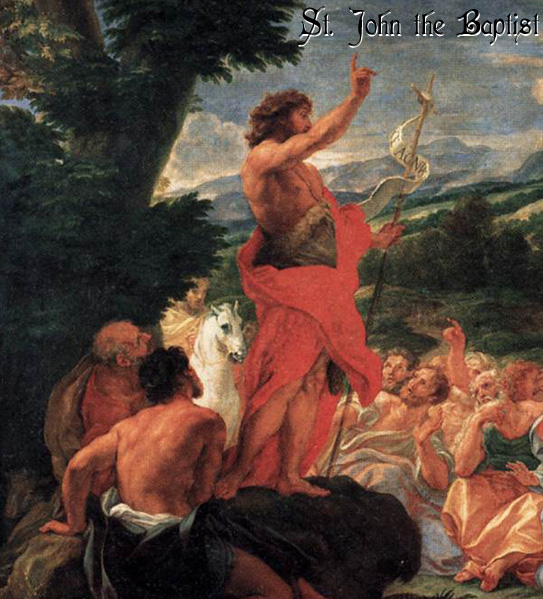
June 21st--St. Aloysius Gonzaga
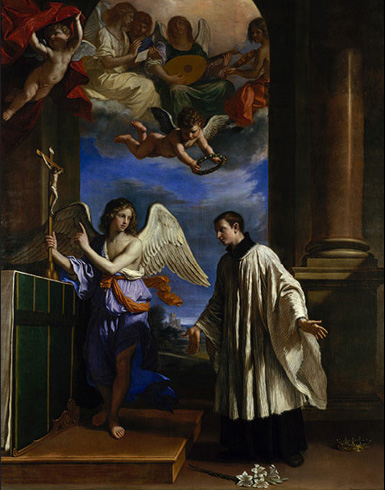
Act of Consecration to St. Aloysius Gonzaga
June 11th--The Feast of Corpus Christi
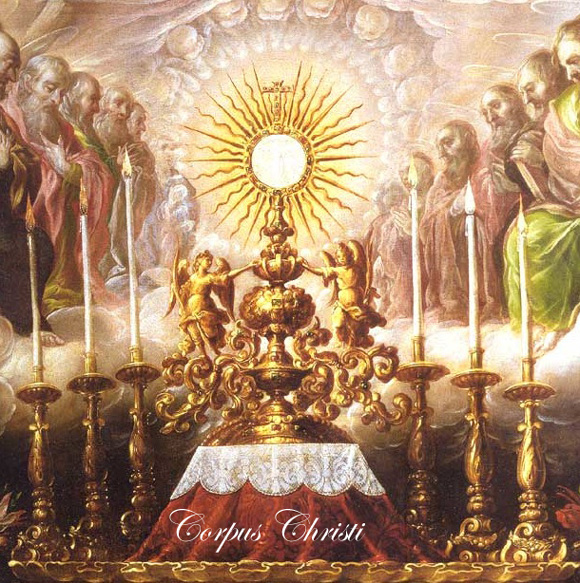
June 8th--The Queenship of the Blessed Virgin Mary
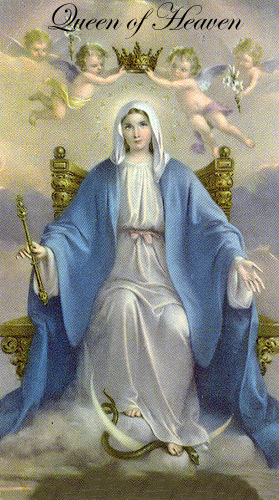
June 1st--June Meditations on the Sacred Heart
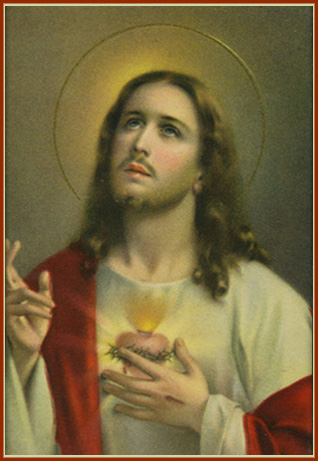
May 24th--The Ascension of Our Lord

May 21st--The Resurrection and Ascension of Our Lord
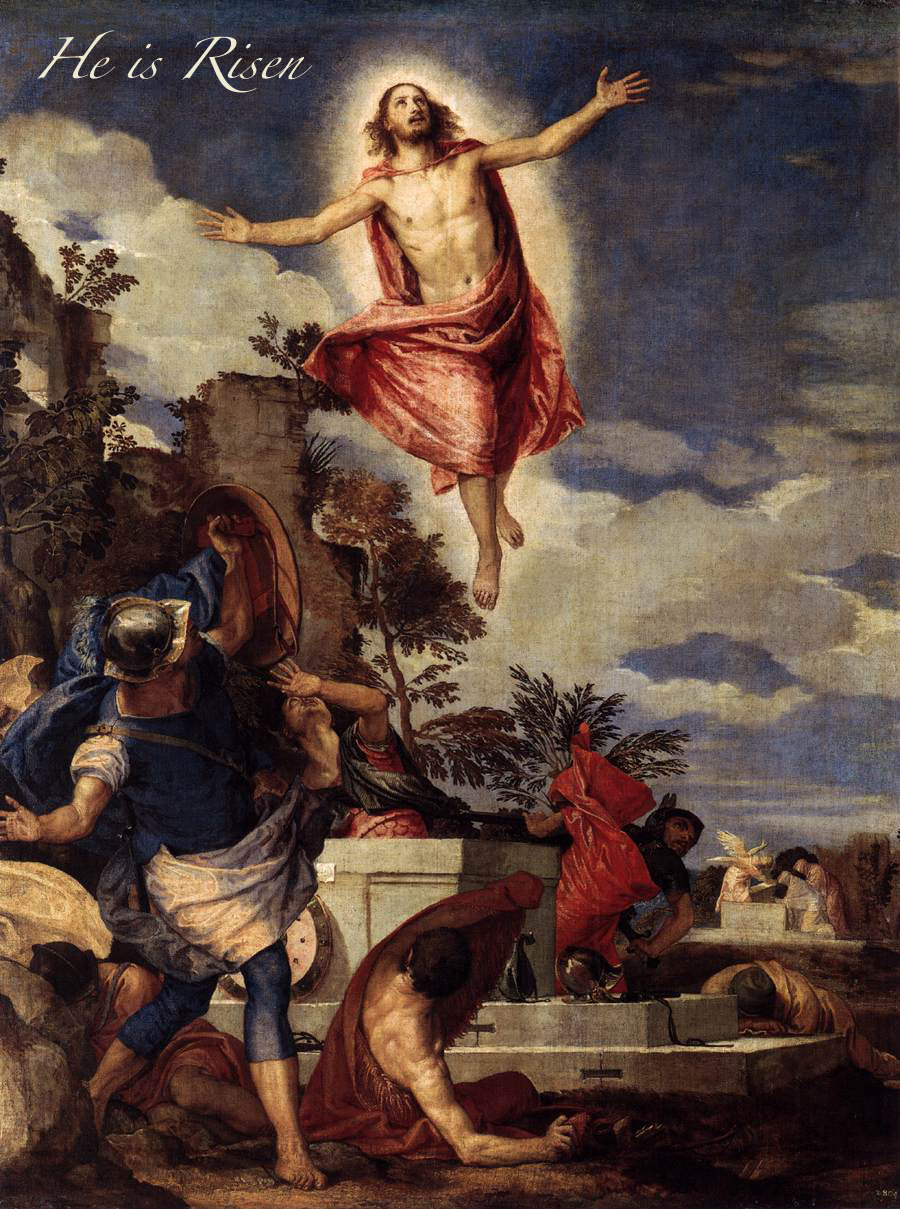
Oratorio, "Christ on the Mount of Olives"
Ludwig Van Beethoven
(1770-1827)
Hallelujah unto God's Almighty Son Praise the Lord,
ye bright angelic choirs
In holy songs of Joy.
Man, proclaim his grace and glory,
Hallelujah unto God's Almighty Son
Praise the Lord in holy songs of joy.
April 10th--O Sacred Head Surrounded Video
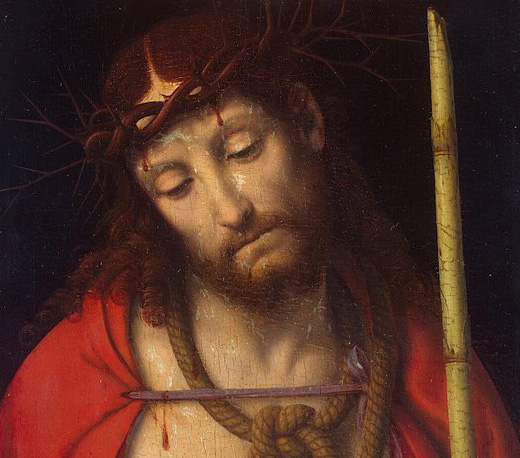

Jesus must be at the Marriage, if it is to be a happy one. Purity of body and soul are required, if Christ is to be present at the marriage. How elaborate are the worldly preparations in many marriages. Clothes and finery and all other worldly affairs are thought of and prepared a long time before the marriage. There is no objection to making this great day of one's life a solemn occasion; but while the outward preparations are made with great care, should not the interior preparation of heart and soul receive still more attention? Guests are invited; but would it not be sad if the greatest of all guests and the only one whose presence is essential to true happiness were neglected or thought of only at the last minute?
(Continued)
June 24th--The Nativity of St. John the Baptist
from the Liturgical Year (1904)
There hath not risen among them that are born of women a greater than John the Baptist, are the words to be spoken by the Man-God of His Precursor (St. Matth. xi. 11); and already has Gabriel, when announcing both of them, declared the same thing of each, that he shall be great (St. Luke, i. 15-32). But the greatness of Jesus is that He shall be called the Son of the Most High, and the greatness of John is that he shall go before Him (Ibid). The name of John brought down from heaven, like that of his Master, proclaims the grace which Jesus, by saving mankind, is to bring to the world (St. Luke, i. 13-.31). Jesus Who cometh from above in person, is above all, it is He and He alone Whom all mankind is expecting; John who is of earth, on the contrary, hath nothing but what he hath received; but he hath received to be the friend of the Bridegroom (St. John iii. 27-31), his usher; so that the Bridegroom cometh not to the Bride, but by him (Ibid. i. 7).
(Continued)
April 1st--The Clock of the Passion
by St. Alphonsus De Liguori

St. Alphonsus (1696-1787) devised the Clock of the Passion as a meditation for Passion-tide during Lent to follow Jesus the last twenty-four hours of His life on this earth. His intent was to motivate each person to cherish a tender devotion towards Jesus Christ in His Passion. The events are put in sequence as found in Scripture and Sacred Tradition.
We have assembled beautiful religious art on the Passion of Christ to coincide with St. Aphonsus de Liguori's time line placed at the top of each painting. In addition, we have added excerpts from approved Church Litanies to encourage prayer as you meditate on the Passion of Our Lord. The music chosen is the solemn Agnus Dei by Samuel Barber in the form of his Adagio for Strings.
We have assembled beautiful religious art on the Passion of Christ to coincide with St. Aphonsus de Liguori's time line placed at the top of each painting. In addition, we have added excerpts from approved Church Litanies to encourage prayer as you meditate on the Passion of Our Lord. The music chosen is the solemn Agnus Dei by Samuel Barber in the form of his Adagio for Strings.
(Continued)
March 28th--Index for the Season of Lent
Passion-tide and Easter

A
compilation of prayers, devotions, readings, sermons and videos from our site to especially enhance your meditations and prayer life during this holy season. Additional updates will be added during Holy Week through Easter.
July 16th--Our Lady of Mount Carmel

According to the most ancient Carmelite chronicles, the Order has its origins with the disciples of the prophets Elias and Eliseus. They lived in caves on Mount Carmel. They honored the Queen of Heaven as the Virgin who is to give birth to the Saviour. When the reality replaced the symbol, the pious ascetics of Carmel were converted to the Christian Faith. In the 12th century, many pilgrims from Europe who had followed the Crusaders came to join the solitaries. A rule was established and the Order began to spread to Europe. (Continued)
Prayers and other devotions to Our Lady of Mount Carmel are also available at this link.
July 1st--July Meditations on the Precious Blood

Why is the Blood of Jesus called the Precious Blood? Because it was the blood of God Himself, veiled under the form of man; and therefore every drop of it, flowing through His sacred veins, deserved our supreme homage, as being united to His Divinity. Hence we can adore the Precious Blood as we adore the Sacred Heart of Jesus, and all else that belongs to the Sacred Humanity, with that supreme homage that belongs to God alone. (Continued)
June 24th--The Nativity of St. John the Baptist

After that really holy birthday of the Lord, we do not read of the birthday of any man being celebrated, except that of blessed John the Baptist. In the case of other Saints and elect of God, we know that that day is honored on which, when their works were accomplished and the world conquered and completely subdued, they were born from this present life into the everlasting life of eternity. In others we honor the completed merits of their last day; in this present case, the first day, and the very beginning of this man is holy; doubtless for this reason, that the Lord wished his coming to be attested, lest if he came suddenly and unexpectedly, men might not recognize him. But John was a figure of the old Testament, and typified the law in himself; and therefore John foretold the Savior, just as the law preceded grace. (Continued)
June 21st--St. Aloysius Gonzaga

Act of Consecration to St. Aloysius Gonzaga
O St. Aloysius, so renowned for thy purity of heart, thy humility and obedience, thy special devotion to the Most Holy Sacrament, and thy tender love for the Blessed Virgin Mary, I consecrate myself to thee, beseeching thee to number me among thy fervent clients. Obtain that I may perfectly imitate all thy virtues, especially thy purity and perseverance. Help me with thy prayers, that I may never cease to love my God and sing His praises. Assist me by a special protection at the hour of my death, that I may present myself pure and stainless to the sovereign Judge and enjoy with thee eternal happiness. Amen
The Litany of St. Aloysius as well as other devotions are also available at this link.
June 11th--The Feast of Corpus Christi

The festival of Corpus Christi (the body of Christ) is on the Thursday following Trinity Sunday, consequently in the second week after Pentecost, because soon after the descent of the Holy Ghost the apostlea began to dispense holy communion to the faithful. This festival was instituted some six centuries ago. It was first celebrated in Belgium, by order of the Bishop of Liege, in consequence of a revelation made to a nun, Blessed Juliana (1250), and shortly after Pope Urban IV. decreed that it should be kept throughout the whole Church.
In this procession the sacred Host is carried in a monstrance beneath a canopy, flowers are strewn on the way, and censers swung; the altars of repose are beautifully decorated with lights and flowers in honor of the Blessed Sacrament. In some places four altars are erected, and a pause is made at each, and one of the accounts of the institution of the Blessed Sacrament given by the four Evangelists is read. The four altars signify the four quarters of the world. After the reading of the Gospel, a prayer is added for protection against lightning and tempest, and for a good harvest. This solemn ceremony, which is generally terminated by the Te Deum in the church, cannot fail to impress every beholder. and lead the non-Catholic to inquire what it is towards which such profound reverence and veneration is displayed.
In this procession the sacred Host is carried in a monstrance beneath a canopy, flowers are strewn on the way, and censers swung; the altars of repose are beautifully decorated with lights and flowers in honor of the Blessed Sacrament. In some places four altars are erected, and a pause is made at each, and one of the accounts of the institution of the Blessed Sacrament given by the four Evangelists is read. The four altars signify the four quarters of the world. After the reading of the Gospel, a prayer is added for protection against lightning and tempest, and for a good harvest. This solemn ceremony, which is generally terminated by the Te Deum in the church, cannot fail to impress every beholder. and lead the non-Catholic to inquire what it is towards which such profound reverence and veneration is displayed.
June 8th--The Queenship of the Blessed Virgin Mary

How great should be our Confidence in Mary, who is the Queen of Mercy. As the glorious Virgin Mary has been raised to the dignity of Mother of the King of kings, it is not without reason that the Church honors her, and wishes her to be honored by all, with the glorious title of Queen.
June 1st--June Meditations on the Sacred Heart

The Sacred Heart of Jesus calls for our devotion more than all other symbols of His Love. It is not only the symbol of His love, it is the very source of that love. It is itselt an unfathomable ocean of love which can never be exhausted. When the spear had drawn forth from it the mingled blood and water, there still remained the love with which it loved us, and will love us to the end. From the first moment of the Incarnation to all eternity it has loved us and will love us with an unceasing love.
May 24th--The Ascension of Our Lord

Filled with the Spirit of God, and contemplating the blessed and glorious Ascension of our Lord, the Prophet David exhorts all to celebrate that splendid triumph with the greatest joy and gladness: Clap your hands, all ye nations: shout unto God with he voice of joy.... God is ascended with jubilee.
This, then, the faithful must believe without hesitation, that Jesus Christ, having fully accomplished the work of Redemption, ascended as man, body and soul, into heaven; for as God He never forsook heaven, filling as He does all places with His Divinity.
He ascended by His own power, not being taken up by the power of another, as was Elias, who was carried to heaven in a fiery chariot; or, as the Prophet Habacuc, or Philip, the deacon, who were borne through the air by the divine power, and traversed great distances.
Neither did He ascend into heaven solely by the exercise of His supreme power as God, but also by virtue of the power which He possessed as man. Although human power alone was insufficient to accomplish this, yet the virtue with which the blessed soul of Christ was endowed was capable of moving the body as it pleased, and His body, now glorified, readily obeyed the behest of the soul that moved it. Hence, we believe that Christ ascended into heaven as God and man by His own power.
This, then, the faithful must believe without hesitation, that Jesus Christ, having fully accomplished the work of Redemption, ascended as man, body and soul, into heaven; for as God He never forsook heaven, filling as He does all places with His Divinity.
He ascended by His own power, not being taken up by the power of another, as was Elias, who was carried to heaven in a fiery chariot; or, as the Prophet Habacuc, or Philip, the deacon, who were borne through the air by the divine power, and traversed great distances.
Neither did He ascend into heaven solely by the exercise of His supreme power as God, but also by virtue of the power which He possessed as man. Although human power alone was insufficient to accomplish this, yet the virtue with which the blessed soul of Christ was endowed was capable of moving the body as it pleased, and His body, now glorified, readily obeyed the behest of the soul that moved it. Hence, we believe that Christ ascended into heaven as God and man by His own power.
May 21st--The Resurrection and Ascension of Our Lord

Oratorio, "Christ on the Mount of Olives"
Ludwig Van Beethoven
(1770-1827)
Beethoven wrote but one oratorio, "Christus am Oelberge" ("Christ on the Mount of Olives"). It was begun in 1800 and finished during the following year. The text is by Huber, and was written, with Beethoven's assistance, in fourteen days. The first performance of the work is entirely took place at Vienna, April 5, 1803, at the Theater an der Wien.
The closing number, a chorus of angels ("Hallelujah, God's almighty Son"), is introduced with a short but massive symphony leading to a jubilant burst of "Hallelujah," which finally resolves itself into a glorious fugue. In all sacred music it is difficult to find a choral number which can surpass it in majesty or power.
Lyrics for the HallelujahThe closing number, a chorus of angels ("Hallelujah, God's almighty Son"), is introduced with a short but massive symphony leading to a jubilant burst of "Hallelujah," which finally resolves itself into a glorious fugue. In all sacred music it is difficult to find a choral number which can surpass it in majesty or power.
Hallelujah unto God's Almighty Son Praise the Lord,
ye bright angelic choirs
In holy songs of Joy.
Man, proclaim his grace and glory,
Hallelujah unto God's Almighty Son
Praise the Lord in holy songs of joy.
April 10th--O Sacred Head Surrounded Video

The hymn is based on a long medieval Latin poem, Salve mundi salutare, with stanzas addressing the various parts of Christ's body hanging on the Cross. The last part of the poem, from which the hymn is taken, is addressed to Christ's head, and begins "Salve caput cruentatum." The poem is attributed to St. Bernard of Clairvaux (1091-1153).
Lyrics: O Sacred Head Surrounded
(Latin: Salve caput cruentatum, St. Bernard)
O Sacred Head surrounded
By crown of piercing thorn!
O bleeding Head so wounded,
Reviled and put to scorn!
Death's pallid hue comes o'er Thee,
The glow of life decays,
Yet angel hosts adore Thee,
And tremble as they gaze.
In this, Thy bitter passion,
Good shepherd, think of me,
With Thy most sweet compassion,
Unworthy though I be:
Beneath Thy cross abiding,
Forever would I rest;
In Thy dear love confiding,
And with Thy presence blest.
(Latin: Salve caput cruentatum, St. Bernard)
O Sacred Head surrounded
By crown of piercing thorn!
O bleeding Head so wounded,
Reviled and put to scorn!
Death's pallid hue comes o'er Thee,
The glow of life decays,
Yet angel hosts adore Thee,
And tremble as they gaze.
In this, Thy bitter passion,
Good shepherd, think of me,
With Thy most sweet compassion,
Unworthy though I be:
Beneath Thy cross abiding,
Forever would I rest;
In Thy dear love confiding,
And with Thy presence blest.
April 9th--Easter Sunday and the Spiritual Resurrection
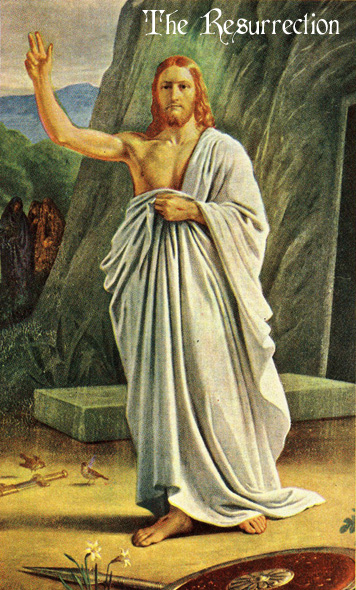
"Let us feast, not with the old leaven, nor with the leaven of malice and wickedness, but with the unleavened bread of sincerity and truth.--i Cor. v. 8."

"Let us feast, not with the old leaven, nor with the leaven of malice and wickedness, but with the unleavened bread of sincerity and truth.--i Cor. v. 8."
St. Paul addressed these words to the faithful of Corinth, from Ephesus, around Easter time toward the end of his third missionary journey. He is referring to the Jewish custom of excluding all leaven from their houses before celebrating the Pasch, and he tells his Christian readers to celebrate the coming feast of the Resurrection of our Lord, by excluding from their souls the leaven of sin and wickedness, and by feasting with the unleavened bread of sincerity and truth. In other words, the Apostle is reminding the faithful of Corinth that the way to celebrate the new Pasch, the Feast of Easter, is to have their souls free from sin and adorned with the grace of Christ. As Christ, from the state of natural death, rose glorious and immortal on Easter Sunday, so the Christian, who wishes to be associated with his risen Lord and worthily to keep the great feast of the Resurrection, should rise from the state of sin and moral death to that of grace and life.
As Christ rose from the darkness of the tomb, freed from the winding sheet of death, and all the fetters of the grave, so the soul risen from sin to the state of grace should cast aside those evil habits, those bad companionships, those sinful and worldly attach merits which have before enslaved it and bound it down to earth. 3. The body of the risen Saviour was endowed with glorious qualities--it was bright, immortal, swift of movement incapable of being impeded in its actions by any obstacles. Likewise the soul risen from deadly sin takes on the brilliancy of sanctifying grace and the glow of heaven; it should be swift to heed God's impulses and fulfill His commands; it should be undeterred in the service of its glorified Master by any temptations, allurements, or other obstacles to its salvation; finally like Christ it should rise to die no more.
As Christ rose from the darkness of the tomb, freed from the winding sheet of death, and all the fetters of the grave, so the soul risen from sin to the state of grace should cast aside those evil habits, those bad companionships, those sinful and worldly attach merits which have before enslaved it and bound it down to earth. 3. The body of the risen Saviour was endowed with glorious qualities--it was bright, immortal, swift of movement incapable of being impeded in its actions by any obstacles. Likewise the soul risen from deadly sin takes on the brilliancy of sanctifying grace and the glow of heaven; it should be swift to heed God's impulses and fulfill His commands; it should be undeterred in the service of its glorified Master by any temptations, allurements, or other obstacles to its salvation; finally like Christ it should rise to die no more.
And, dear brethren, there is something else that we must never forget. That bitter suffering and death was for ME and for YOU, for each one of us singly. Every one of us can look at Jesus in His sufferings and truthfully say, "He is doing this for ME; because of MY sins. My sins drew from Him that agonizing sweat of blood; my sins mocked and scourged Him: I, wretched sinner that I am--I nailed Him to the Cross and slew Him there." You know, dear brethren, that when Our Lord comes to us in Holy Communion, He is not divided among the many who receive Him. Each one of us receives Him whole and entire; many together do not receive more than one. Similarly in His Passion--it is all for each one. St. Paul teaches us this in the words of my text. "He loved me, and delivered Himself up for me." Thus, then, when we ask the question, "Why had He to suffer this? " the answer is not merely "Because of sin," but "Because of my sins."
When true contrition pervades the soul, all the affections of the heart, which had been turned from God to sin, will be restored to Him: the soul will lament its separation from the source of all its good, will bewail its own state of wretchedness and dereliction, and even more than its own misfortune, will grieve that the author of all sanctity, the God of all purity, and loveliness, and beauty, and perfection, has been offended--basely, ungratefully offended--by His creature, the work of His hands, the object of His regard and affection. . . .
The Meaning of Contrition
Why Contrition is called Sorrow
Why this part of penance is called Contrition
Sorrow for sin should be Supreme
Contrition should extend to all Mortal Sins
The qualities of True Contrition
The Effects of Contrition
Contrition must be Interior
Why Contrition is called Sorrow
Why this part of penance is called Contrition
Sorrow for sin should be Supreme
Contrition should extend to all Mortal Sins
The qualities of True Contrition
The Effects of Contrition
Contrition must be Interior
After Confession
1. As soon after Confession as you conveniently can, perform your Penance, and renew your resolutions of avoiding all sin, and of taking all the means for so doing, by avoiding the occasions and temptations of sin; and then you may have a perfect confidence, with devout thankfulness, that all your sins, through the mercy of God, are forgiven.
2. Consider how you can amend your life. This will be best done by fixing your attention on one or two of your more prominent defects of character, and directing your chief efforts to overcome these by such means as the following; 1. Conceive a strong desire to overcome these faults, frequently renew your resolution, and examine yourself particularly upon them. 2. When you commit them, punish yourself in some way for it. 3. Endeavor always to have the thought of Christ present in your mind, and direct short prayers to Him, especially when you are attacked by temptations, or when you are necessarily exposed to the danger of sinning. 4. Meditate frequently on those subjects most calculated to excite your fears, hopes, and affections, as Death and Judgment, the Love of God, His kindnesses to you. His promises, etc. Be earnest and persevere with a good hope of victory, through the grace of Jesus Christ.
Thanksgiving After Confession
Prayer before performing Penance (St. Gertrude)
A prayer for the Priest
Prayers for Pardon and Amendment
Prayers against the Seven Deadly Sins
Seven Thanksgivings for the Seven Shedings of Our Lord's Blood
Psalms of Thanksgiving for a good Confession
(Continued on link)
Prayer before performing Penance (St. Gertrude)
A prayer for the Priest
Prayers for Pardon and Amendment
Prayers against the Seven Deadly Sins
Seven Thanksgivings for the Seven Shedings of Our Lord's Blood
Psalms of Thanksgiving for a good Confession
(Continued on link)
Approach the Confessional in a humble and. contrite spirit, and kneel down by your Confessor. Then, making the sign of the Cross, say:
Benedicite, or Bless me Father for I have sinned.
(Continued on link)
(Continued on link)
April 4th--Examination of Conscience according to the Ten Commandements
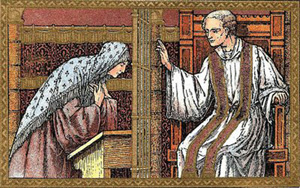
The First Commandment
2nd Commandment
3rd Commandment
4th Commandment
5th Commandment
6th and 9th Commandments
7th and 10th Commandments
8th Commandment
The Seven Deadly Sins and Contrary Virtue
Nine Ways of Being Accessory to Another's Sin
The Six Sins Against the Holy Spirit
Four Sins Crying to Heaven for Vengeance
(Continued on link)

The First Commandment
| Have I been negligent in the worship of God, seldom or never adoring and praising Him, or giving Him thanks; praying but little or with little attention? | How long has this negligence continued? | Have I neglected to make acts of faith, hope, or love of God; have I neglected to say my morning and evening prayers? | How long has this negligence continued? |
2nd Commandment
3rd Commandment
4th Commandment
5th Commandment
6th and 9th Commandments
7th and 10th Commandments
8th Commandment
The Seven Deadly Sins and Contrary Virtue
Nine Ways of Being Accessory to Another's Sin
The Six Sins Against the Holy Spirit
Four Sins Crying to Heaven for Vengeance
(Continued on link)
Three Qualities of a Good Confession
1. Let your confession be ENTIRE; i.e., do not conceal knowingly any one mortal sin; otherwise, so far from obtaining Absolution, you do but add to your sins. State the kind of sins you have committed, and, as far as you can, their number; and mention any circumstances which you think would change the nature of your sins.
2. Let your confession be TRUTHFUL. Let everything be mentioned sincerely and exactly, without any disguise or dissimulation; let the certain things be mentioned as certain, the doubtful as doubtful. Avoid all excuses for yourself, either direct or Indirect; and take the greatest care not to throw blame on any one else, or to mention or hint at the name of any third person. Avoid all superfluous words and matter, and everything which does not directly concern the Integrity of the confession. Be as concise as you can, consistently with fulness and candor.
3. Let your confession be HUMBLE, remembering that you are in an especial manner in the presence of God, from whom, through His Priest, you are seeking and expecting pardon. The thought of God at this moment will be your best protection against all false shame, insincere trifling, and affectation.
For the Grace of the Holy Ghost
For a Pure Heart
Reflection before Examination of Conscience
Causes Which Render Confession Invalid
To receive the sacrament of Penance worthily, we must. . .
Three Qualities of a Good Confession
Prayers Before Examination of Conscience
To Implore the Divine Assistance in order to make a good confession
Prayer after Examination of Conscience
Prayer before Confession
(Continued on link)
For a Pure Heart
Reflection before Examination of Conscience
Causes Which Render Confession Invalid
To receive the sacrament of Penance worthily, we must. . .
Three Qualities of a Good Confession
Prayers Before Examination of Conscience
To Implore the Divine Assistance in order to make a good confession
Prayer after Examination of Conscience
Prayer before Confession
(Continued on link)
The simplest method of examination of a conscience is to recall the different commandments of God and the teachings of the Church; and see in what way and how often we may have broken them. It is also useful to recall the seven deadly sins and our predominant passion and bad habits. We should also notice in what way we may have neglected the duties of our state of life. We must bear in mind that we may fall into sin either by thought, word, deed or omission. Our ruling passion is the chief cause of our sins.
(Continued on link)
These daily meditations honoring St. Joseph are taken from the works of Rev. R. F. Clarke, S.J. and provide insight into the life of the Foster Father of Our Lord. By reflecting upon his joys, sorrows, strength and purity, we are inspired to imitate his virtues and ask for his protection.
The Psalter of Jesus is a devotion containing fifteen principal petitions,
which ten times repeated makes one hundred and fifty, for graces
necessary to the spiritual life of the soul; every five petitions has an
antiphon and are followed by Our Father, Hail Mary and Credo. Following
the Ten repetitions of each petition (example Jesus help me , Jesus help me--
ten times) are varying number of verses for meditation. Composed in
England by the Brigittine monk, Richard Whitford (1467-1558), who called
himself "the Wretch of Sion", this devotion was near and dear to the hearts
of English Catholics in the days of persecution and is especially beneficial today
during this season of Lent.
When our Lord at the Last Supper told the Apostles that He was about to leave them, their hearts were filled with sadness and loneliness. But to comfort them He promised to send them another Paraclete, His Holy Spirit, who would console them and take His place among them. Moreover, He gave them a further unfailing means of obtaining comfort and help in their sorrows and needs, and this was prayer to the Father in His name. At all times they could speak to, and commune with their heavenly Father; and to assure them that their prayers would be answered. He introduced His promise with those solemn, words, which are equivalent to an oath, "Amen, amen, I say to you." This guarantee of our Lord, however, that the Father will hear us, extends only to those prayers which are made in the name of Christ; that is, which have the proper qualities, and are accompanied by the proper conditions. He prays in the name of Christ who prays for that which pertains to salvation (St. Gregory, St. Aug.).
Intimately connected with religion, even in its primary dictates, is the duty of prayer. Our Blessed Saviour insisted upon this duty in word and example throughout His life. "Lord teach us how to pray," was the request of His apostles, and He answered the request by giving the most beautiful Prayer that was ever uttered. No prayer will go unheeded, for He has given us the word: "And I say to you. Ask, and it shall be given you; seek, and you shall find; knock, and it shall be opened to you. For every one that asketh, receiveth; and he that seeketh findeth; and to him that knocketh it shall be opened" (Luke xi. 9, 10).
All content on our site, including this page on "Prayer", dates before the Second Vatican Council, belonging to the Traditions of Our Catholic Faith as handed down by Our Lord and taught at the Council of Trent.
All content on our site, including this page on "Prayer", dates before the Second Vatican Council, belonging to the Traditions of Our Catholic Faith as handed down by Our Lord and taught at the Council of Trent.
http://catholicharboroffaithandmorals.com/
